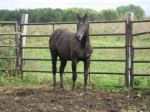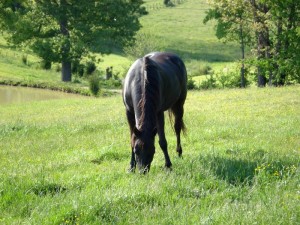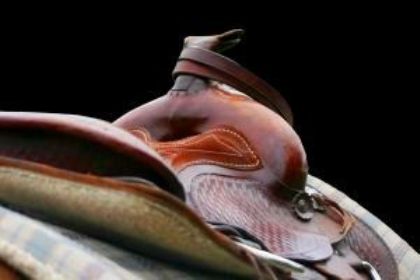 I always think about my black colt this time of year. If you read my previous post about saying goodbye to a horse, and my horse poems I wrote about his death, you understand part of the story. But I would like to tell the rest of the story and give more of a background about this horse that was so special to me.
I always think about my black colt this time of year. If you read my previous post about saying goodbye to a horse, and my horse poems I wrote about his death, you understand part of the story. But I would like to tell the rest of the story and give more of a background about this horse that was so special to me.
The summer before my senior year of high school, my dad started talking about selling some horses. We had our own stallion, a grandson of Two Eyed Jack, and three broodmares, and then probably about twenty other horses—mostly ranch geldings and colts we were raising and training. We really didn’t think Dad was serious about selling a bunch of them, until we got a visit from Howard Pitzer himself, the breeder and owner of the great Two Eyed Jack, and he was looking for Jack-bred horses to round out his annual production sale. I remember him riding along in our Suburban out through the pastures to look at the mare bunch. I got out and walked over to our stallion Jack, slipped my arm around his bulky neck, and led him over to the Suburban for Howard to take a look.
Dad sold seven horses that day, and we delivered them to the Pitzer Ranch the next weekend. All of us kids were upset with Dad, since two of our good trained ranch geldings were in the bunch, and we were sad that we would no longer have baby foals every spring. Even my mom was indignant that he had sold a bunch of our horses. But I’m sure we were overlooking the fact of how much it costs to keep that many horses, and how little use we were actually getting out of the ones Dad sold. I remember thinking that we hadn’t gotten anywhere close to what the horses were worth, especially since the horses were just going to be sold at the Pitzer Ranch production sale, but the feelings I had were just typical of a horse crazy girl who gets too attached to things that don’t specifically belong to her. But we were all sad.
I think Dad felt sorry for us, or guilty about selling them, because that winter, he started talking about buying me a colt to train during my senior year, and I could ride it all spring and summer, and then sell it right before I left for college. He said any profit I made after the initial purchase price of the colt was deducted, I could keep for myself. I wasn’t thinking about the money, all I could think of was that Dad was letting me buy a horse!
So I started reading the classified ads in the local papers, and we found a guy with some registered Quarter Horse yearlings and two year olds, and they were black. I’ve always had an eye for a black horse, so Dad agreed to go look at them, and we made an appointment to drive out there that weekend.
Now, looking back on it all, it is strange how the very small decisions you make, on just the spur of the moment, can make such a big impact on your life. I’ve often wondered how different things might have been if I had just chosen a different ad in the paper….and I’ve second-guessed the whole thing so many times it’s dizzying. But my choice in that colt was so casual, just happenstance, and there was nothing definite that I was looking for in a horse that made me pick that ad. I just dialed the number, agreed to come look at the horse, and it was done.
The farm was a couple hours away, if I remember correctly. I can still picture driving up to the place, seeing the muddy pens, weanlings wearing halters with the ropes dragging around their feet, and a pretty shoddy appearance to the whole farm. A man wearing stained coveralls and carrying a cattle sorting paddle came out to greet us. He told us to pull our trailer around back by the chute, so we parked there and got out.
We climbed over the corral fence to see a small black horse in the far corner of the pen. He was as wild as a deer, head up, spooked, and never taking his eyes off of us. “This is the two year old,” the farmer said gruffly. Dad asked the him a few questions about the horse’s bloodlines, and I just stood there and watched the colt watch us. Finally, Dad asked me, “Well, do you like him?” I remember feeling very shy about making the decision. I didn’t want the responsibility of making the wrong one. So I said, “I like his color.”
We stood there awhile longer, and Dad said, “Well, we’ll take him.” He paid the guy $900 for him, and the guy handed over his registration papers. He ran the colt into the chute and into the trailer….like I said, he was as wild as a deer. I wondered later if it had anything to do with the cattle sorting paddle in the guy’s hand…most likely the colt had either been abused or frightened out of his wits by this farmer.
All the way home, Dad and I made plans for where we were going to keep this colt and how we might gentle him. We decided to keep him in one of the corrals and put a very gentle old gelding in with him and just let him get used to us for awhile. Sometimes it takes nothing more than good feed, some sweet grain, and regular exposure to humans for a horse to change his mind and settle down.
It just didn’t happen that way, though. This colt would run to the far end of the pen when you walked in carrying hay. He would never take his eyes off you, and if you did get close to him, he’d wheel and turn his heels in your direction. It was all in self defense, but it didn’t bode well for me making him the sweet riding gelding I wanted him to be.
We bought him in January, and a few months later as it was warming up outside and I was wanting to start working with my colt, I asked Dad if he would help me get a halter on him. I think if I had just waited, or if I had had access to a round pen it would have made such a difference. But me being the impatient teenager I was, I ran him into our cattle chute and closed the gate close behind him and got a lariat rope around his neck. I was working to get the halter on over his head, but he was really fighting me and what he did was leap up into the air and came down with one of his hind legs out sideways through one of the wooden fence planks of the chute.
I ran to get my dad, because I couldn’t get his leg back out and he was kicking and thrashing, making it very dangerous and difficult to grab his leg. Dad came finally, and was able to push his hind foot back through the fence. We could see though, that the two or three minutes of constant thrashing had worn the hide off the inside of his back right leg. I felt horrible.
We did get the halter on him, and left the lead rope dragging, and he limped out to join his buddy, the older gelding. We put them in the barn, and I was able to reach up and pet the tip of the colt’s nose, but he would snort and jerk away from my touch. We put him in a stall up against the wall and sprayed some antibacterial ointment on the wound, but that was about as close as we could get to helping him, he was just so flighty.
I spent a lot of time with my injured colt, and he really started making changes in his demeanor. He would allow me to pet him as far as I could reach, over his head, neck, and shoulders, but if I tried to move to his side, he would pivot to face me again. I don’t know why, but his trust was just so shaky he would not relax around me. We gave him a series of penicillin shots to keep infection out of his leg, and I applied topical salve twice a day. By the end of March, the colt was looking much better. Hair was growing again over the scar in his leg, and he was walking without a limp. He had made little progress in his behavior, however, so I asked a local trainer friend of mine to come over and help me.
My problem was this. I could catch him by picking up the end of his dragging halter rope, and I could lead him all around, but at odd times or whenever the colt spooked at something, which was often, he would bolt and rip the lead rope right out of my hands, and I was powerless to hold him when that happened. I felt that our training could not continue until he would respect the lead rope more and let me catch him whenever I wanted to.
So the trainer came over, and I had the colt in the barn, eating hay with my old gelding. I handed the lead rope to the trainer, and warned him that the colt would probably take off as soon as the barn door opened. Sure enough, that’s exactly what happened, and he about got away. But the trainer held onto the very end of the rope and got him stopped.
Then the trainer let him have a little slack, and when the colt started to run away, he would give a strong pull on the rope and would swing the colt around. He called this “busting him out”, and would continually let the colt get started off away from him, then give a hard pull and snap him back around facing him again. This continued until the colt was tired and not wanting to run away anymore. He stood there with his head lowered, beat.
The trainer then told me to come up and pet the colt, and when I did he didn’t move or try to get away from me, he just stood there. I was able to take his halter off for the first time since I’d bought him. I led him around, petted him, walked all the way around him touching him all over, and he never pulled away or acted afraid. I was certain we had made progress and I’d be able to start riding him soon.
However, the next morning when I came out to feed my colt before school, the previously injured hind leg was swollen up like a tree trunk and he could not move. He would pivot around on his other three legs, but that right hind leg was completely useless, he could not put any weight on it at all. It was about four times its normal size, and he was in obvious pain.
You might ask, at this point, where the veterinarian was in all of this, and if there is anything at all that I learned through this whole horrible experience it’s to call the vet at the first indication of trouble. As it was, we were out in the middle of cow country, and my dad was giving the colt daily shots of penicillin, so we thought that was good enough. There was really no wound to treat, as the old wound was completely haired over and had apparently healed. But what was injured was the hock joint. And I think there was probably lingering infection from that old leg wound that dropped down into the hock and just completely blew it up. My colt was tame now, but the sad part of it was that he really didn’t have a choice.
I spent all my spare time with him, and I remember one day in April as he was starting to walk a little more I took him out for a walk and let him graze the new spring grass that had started to grow. I was washing his leg daily in cold water, trying to keep the swelling down, but one evening I noticed an ominous click each time he took a step. I didn’t know what it was, but it didn’t sound good at all.
The next morning I went out before school to feed the horses, and he was lying in the hay and didn’t get up when I approached. I knew something was terribly wrong, because though he was much more gentle, he would always stand up when he saw you. I petted him and tried to get him up, and he simply lay there without trying. I ran to the house, crying, and interrupted my dad’s morning coffee, saying my colt was dying and couldn’t stand up.
Dad came out with me, and when he looked at the colt’s leg, he said, “No, don’t look—it’s bad.” He gave me a hug and said, “Well, you’d better tell him goodbye and then get to school.” And I knew that meant he was going to put him down as soon as I left. I cried into his fuzzy black mane and promised that I would tell his story. I planned to write a book about him someday, and I wanted him to be able to live out that life he was robbed of. I felt so much blame and guilt as I left for school, leaving him lying in the barn. I knew I would never see him again.
I never got a photograph of my black colt, but I kept the cockleburrs I had pulled out of his mane. My school day was useless, I spent it in tears, and wrote poetry about my horse in between assignments. When I got home, all I found at the barn was his halter, hanging on the wall near the door. It took me a long time to feel okay about the whole thing, and my dad never said a thing about the money he lost.
In hindsight, I wish I had done so many things differently. If I had given the colt more time and not resorted to putting him into the cattle chute to get his halter on, I might have been able to gentle him gradually without any injuries. If we had called a vet for his first injury, he might have advised us to wait a good six months before going ahead with his training. And if I had cautioned the trainer on not putting any stress on his back legs, I wouldn’t have lost my colt. The trainer being a friend of mine, apologized repeatedly, and has subsequently referred to himself as “the guy who killed your horse” with regret in his voice.

It’s hard for me to write this story, because I still place so much blame on myself for my colt’s death, and it makes me feel vulnerable for others to know about the mistakes I made. But the purpose I can find in it is to show others how careful you have to be with horses, and how it only takes a moment or one bad decision to result in irreparable injuries. It definitely taught me a hard lesson in life, and that is that the thing you love most can be taken away from you in a split second, and it’s a loss I hope to never experience again.

